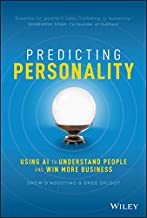By William Carmichael
Oh, he’s just wired that way! As familiar as you may be with this innocuous expression, wouldn’t you agree that there always seems to be just a bit of light sarcasm projected? And despite the good humor intended, that person has just been earmarked as someone who thinks differently. He could be a friend, co-worker, boss or even a customer for that matter. But by “being wired that way,” surely, he belongs in that dreadful category of people who cannot or will not change! You know . . . those people!! And the result . . . we intentionally avoid similar engagement with him because after all, we already know the outcome, right? But wait a minute . . . could it possibly be that we are wired that way and have simply misread him? If my lighthearted attempt at levity has provoked some uncomfortable memory, Predicting Personality: Using AI to Understand People and Win More Business by Drew D’Agostino and Greg Skloot is a must read.
In this versatile field guide, D’Agostino and Skloot do a remarkable job of describing the pitfalls of two twenty-three-year old’s who felt technological savvy alone could bring about success and instead, found themselves ousted. Getting fired was one thing but terminated by the board of directors of the company they started was . . . well . . . humbling, to say the least. What they found out was there is a high cost to not understanding people. They knew their own talents and potential. What they didn’t know was how to read people and this set them on a new journey; a journey into a groundbreaking new branch of artificial intelligence called Personality AI, which combines personality psychology with data science and machine learning.
Can We Really Predict Personality?
Believe it or not, personality tests have been around for over a century. First used in World War I as a means for determining fitness for battle, the personality test quickly evolved into sophisticated assessments used by industrial psychologists for accurately identifying cognitive traits of managers within business and industry. Tools like DISC, Myers-Briggs Type Indicator (MBTI) and Big Five are only a few of those used today although the DISC “four-factor” personality model is the one selected by our authors. Each has not only stood the test of time but brings the validity and reliability needed by researchers, companies, and legal departments. So yes, personality can be predicted and with uncanny accuracy.
Is it Poor Communication or Misreading Personality?
The reality is that even seasoned managers who consider themselves good communicators get blindsided from time to time. Perhaps one of these four questions from Chapter 2 will look familiar:
- Have you ever seen two well-intentioned people struggle to work together because they can’t seem to get on the same page?
- Have you ever been frustrated with a boss or leader who imposed their own style on everyone else, even when there were clearly more effective ways to do things?
- Have you ever left a job because the role didn’t fit with your lifestyle, personal goals, or cultural expectations?
- Have you ever felt like your thoughtfully crafted emails were getting sucked up into a black hole?
Or how about these four communication failures from Chapter Three?
- The customer who never appears to be satisfied despite your most valiant efforts to appease them.
- The boss who micromanages your work and won’t give you the autonomy you need.
- The prospect who seemed so excited to buy but has since dropped off the map and will not respond to any of your emails or voicemails.
- The coworker who keeps making promises but lets the details fall through the cracks while you pick up the slack.
Our authors attest that “There’s a common problem at the root of each of these communication failures: people are different and we have trouble understanding others who don’t think in the same way we do. . . While we all have the ability to empathize with others and find commonalities, it takes an entirely different skill set to accurately understand another person’s mental model for how the world works and adapt your communication to earn their trust and make the biggest possible impact on them.”
Predicting Personality: Using AI to Understand People and Win More Business examines:
- How Personality AI works
- The complexities of personality and how it relates to human behavior
- Using personality profiles to communicate effectively with anyone and build strong teams
Structure and Layout
Well researched and written, Predicting Personality can easily be read over a weekend. It’s twenty-eight short chapters are structured into six parts designed to help readers understand the complexities of personality traits but without all the technical jargon. Almost a quarter of the book defines the 16 DISC personality types and each type’s: personality traits, strengths and blind spots, communication preferences, and motivators. In other words, it cuts very quickly to the heart of the matter for each personality type so that understanding someone’s distinct personality occurs more quickly. I also liked the flow of themes; from personality facts, how personality works with communication in order to lead others better, to using personality findings wisely. Beyond just a well-structured guide, the authors demonstrate an ethical wisdom for such young entrepreneurs and writers. I highly recommend this one!
Who Will Benefit Most from This Book?
Organizational leaders at all levels, Human Resource Professionals, Corporate Trainers, Sales and Marketing Professionals.
About the authors:
Drew D’Agostino is CEO of Crystal, an app that uses AI to accurately reveal people’s motivations, communication styles, and other behavioral traits. Crystal has been featured in Inc., Fortune, CNN, Fast Company, MIT Technology Review, Wired, and the Guardian.
Greg Skloot is President and COO of Crystal and a passionate evangelist of leveraging AI to better understand personality and build stronger relationships.

Professor | Strayer University william.carmichael@strayer.edu www.strayer.edu
